Syllabus
What is program evaluation?
That question comes up more often than you might expect! In fields like education and counseling, as well as other practitioner-oriented areas, research frequently focuses on understanding the impact of various programs on service recipients, providers, and the broader context in which these programs operate. This process of determining whether and why something works forms the foundation for evaluation, which in turn can inform program and policy decisions. Evaluation has its own set of philosophical, theoretical, methodological, and practical considerations, making it essential to dedicate an entire course to understanding its purpose and execution. This course is designed to help you gain a clear understanding of the choices and processes involved in program evaluation through hands-on experience conducting a small-scale evaluation study relevant to your own interests.
Course objectives
The overall purpose of this course is to empower you to
acquire knowledge of basic models and principles of program evaluation
develop an understanding of program evaluation practice by designing and conducting an evaluation of a relevant program relevant
gain an understanding of ethical, social, political, and cultural issues confronted by program evaluators
write an evaluation report to meet stakeholder information and decision-making needs
Quick Start Guide
Please note that the slideshow goes through highlights of the syllabus, but you are still responsible for reading through the entire site including this page.
| Larger version of the Guide | PDF of the Guide |
\\ \ \ | \\ \ \ |
FAQ
Is the course content difficult?
There is really no way to sugarcoat it - the first seven to eight weeks prior to your evaluation are fairly intense so please plan accordingly. You will be learning about evaluations while simultaneously administering one, which is not an easy task. That said, difficulty is subjective; it varies and often depends on your academic and practical background. Instead of focusing on the level of difficulty, consider the following question:
Can I search for help independently first and then reach out if needed?
If your answer is yes, then you are likely well-positioned to succeed in this class.
Is there a lot of theory?
Evaluation is primarily a practice-based field, so much of what you encounter will reflect that. While theory will appear at times, its role will be limited.
What if I’m a Visual/Aural/Read-write/Kinesthetic learner?
You do not fall into any one of those categories. In fact, there is no widely accepted study that supports a single learning style over another, nor is there solid evidence backing these four specific classifications. Research shows that people learn best through multiple approaches, which is why this course includes both a Readings and Tasks & Deliverables section. At one point, I provided several papers to support this, but many of those sources are also referenced in this excellent video:
What if I find a mistake?
Let me know if you spot anything! I strive to be error-free, but like everyone else, I occasionally make silly mistakes, including grammar and spelling errors.
What do the different pages on the site mean?
These are given in the order you see them in top of the site.
| Readings | Go | Weekly readings | |
| Tasks & Deliverables | Go | Course materials and assessment items | |
| Due | Go | List of things to do | |
| Resources | Go | Curated directory of resources |
Texts
To help keep costs down, you are not required to purchase any physical texts. We will use the materials listed below, all of which are available in digital format through the WVU Libraries, except for the APA 7th edition handbook.
Required
| Davidson, E. J. (2007). Evaluation methodology basics: The nuts and bolts of sound evaluation (1st ed.). SAGE. | Free | Physical | 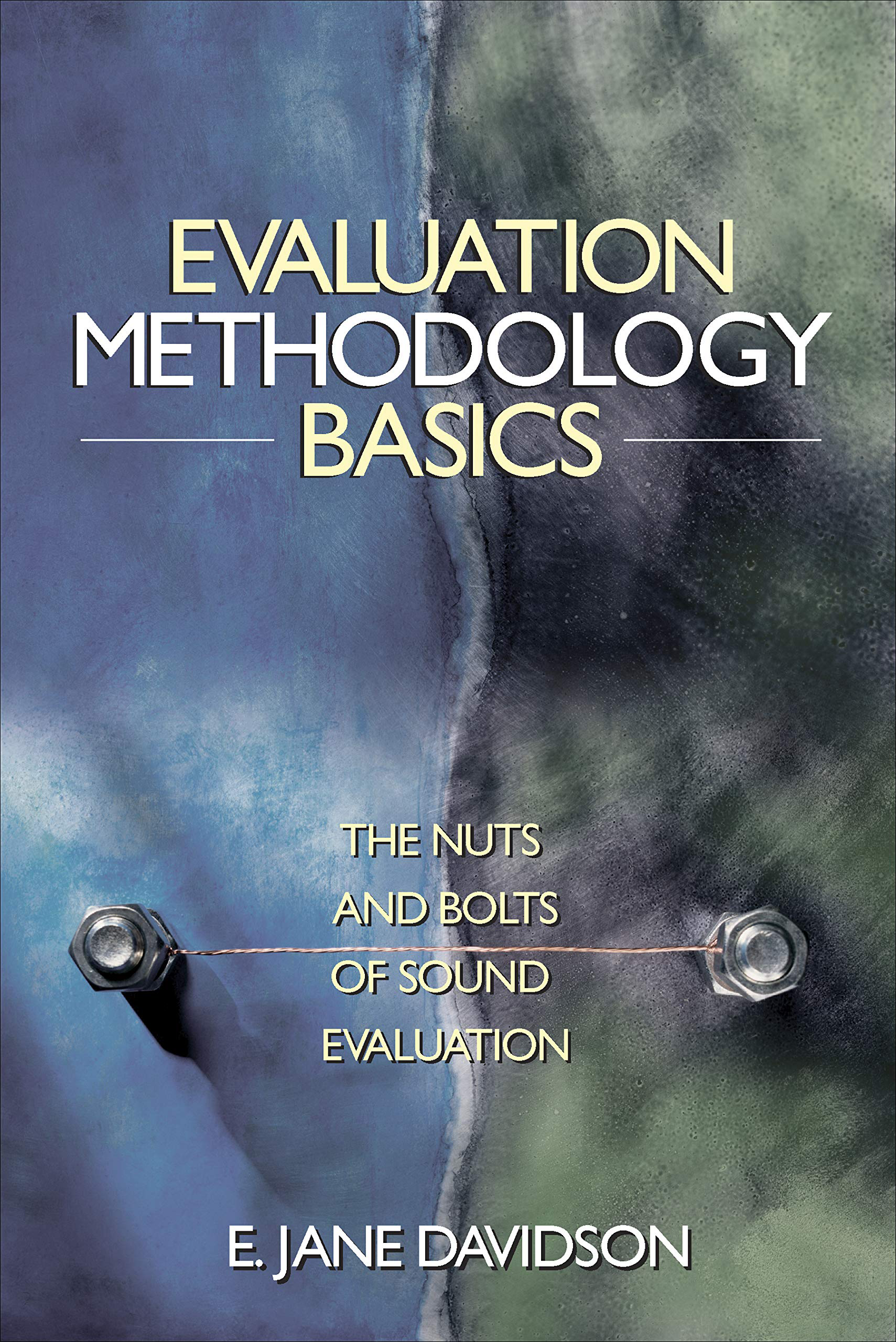 |
Optional
| American Psychological Association. (2020). Publication manual of the American Psychological Association (7th ed.). | Physical | 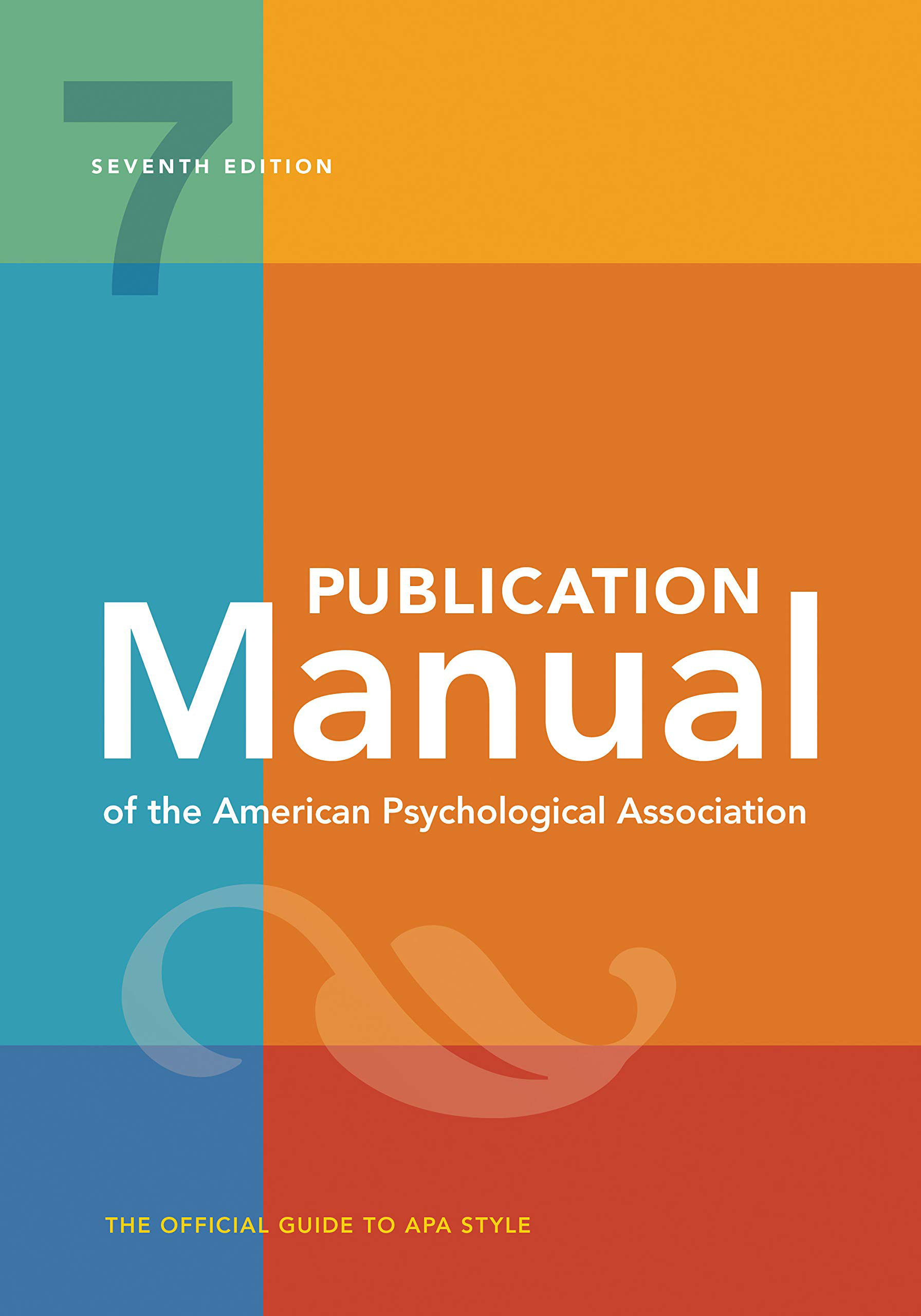 | |
| Dillman, D.A., Smyth, J.D., & Christian, L.M. (2014). Internet, phone, mail, and mixed-mode surveys: The Tailored Design Method (4th ed.). Wiley. | Free | Physical | 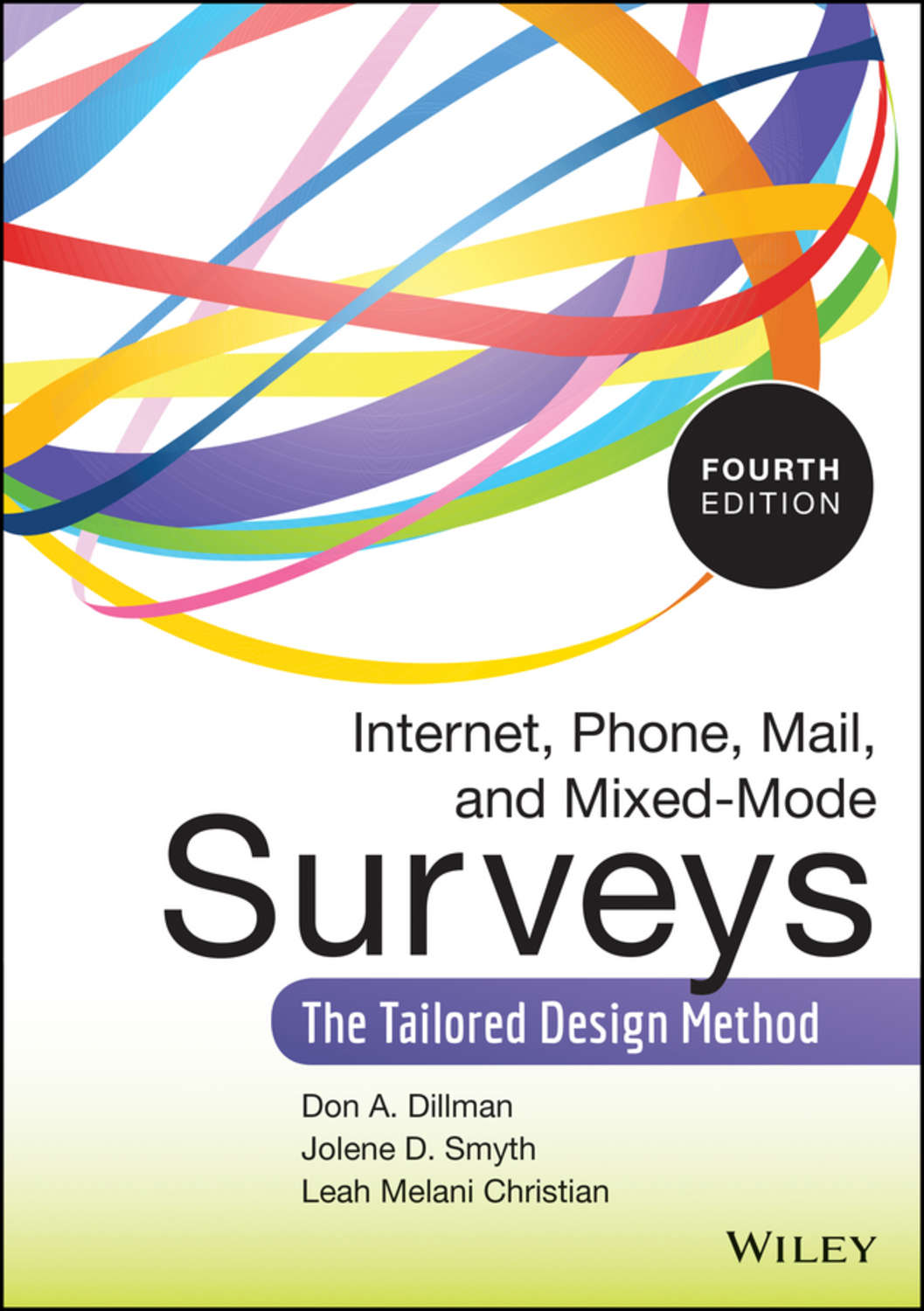 |
| Mertens, D. M. (2018). Mixed methods design in evaluation. SAGE. | Free | Physical | 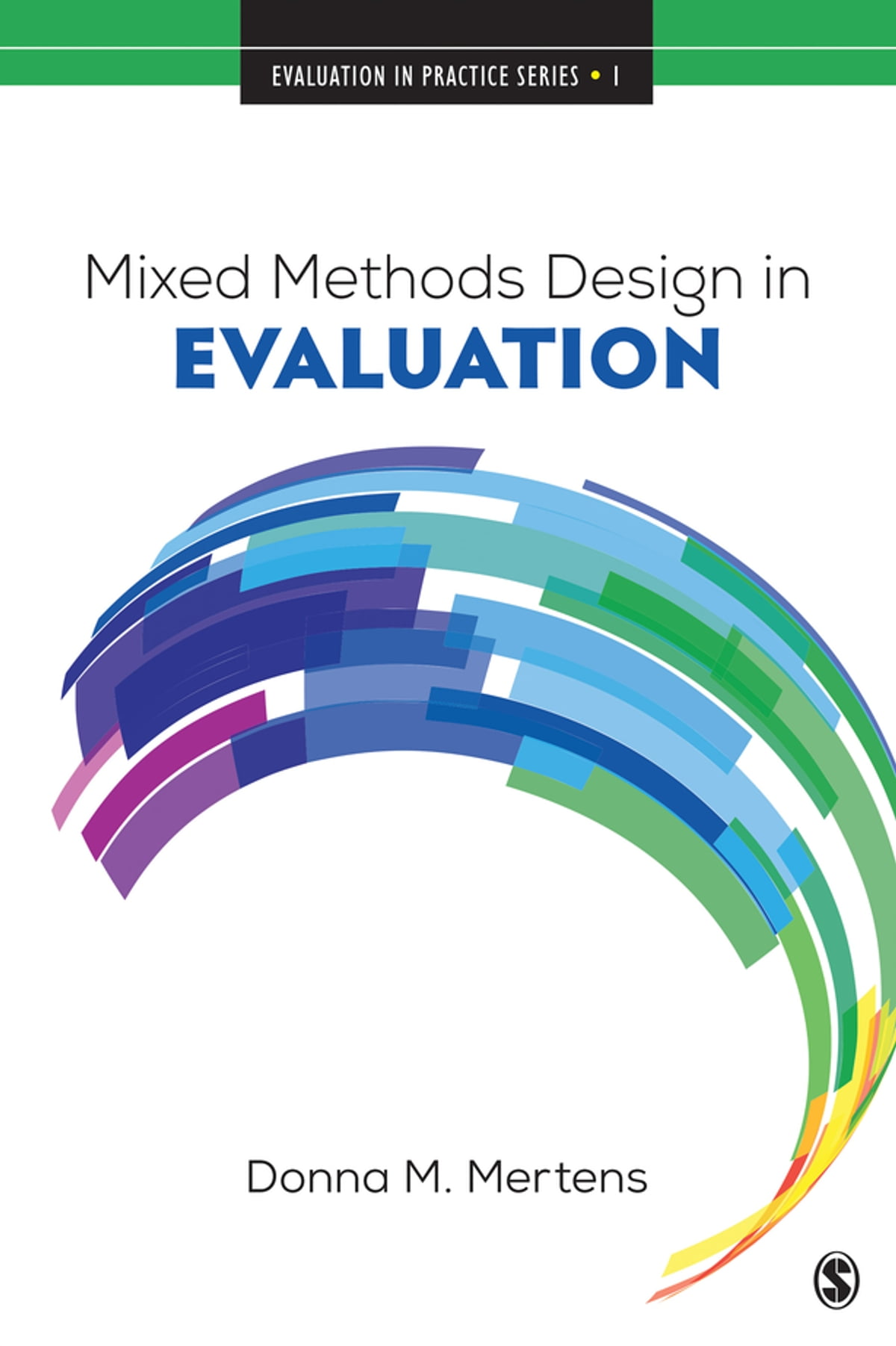 |
There will occasionally be additional articles and videos to read and watch. When this happens, links to these other resources will be included on the content page for that session.
Software
Quatrics
You will need access to your WVU Qualtrics account. Please go to the site and check if you can login. If not, please submit a ticket to IT or give them a ring at 304-293-4444.
Assignments and Grades
You can find descriptions for all posted assignments on the Tasks & Deliverables page
| Percent | Assignment |
|---|---|
| 15 | Weekly Tasks |
| 15 | Synchronous Meetings |
| 5 | Evaluation Prospectus |
| 20 | Needs Assessment |
| 15 | Evaluation Proposal |
| 25 | Final Report |
| 5 | Presentation of Results |
| Grade | Range |
|---|---|
| A | 90–100% |
| B | 80%-89% |
| C | 70–79% |
| D | 60–69% |
| F | < 60% |
All materials are due on a weekly basis by Sunday at 11:59
PM unless otherwise noted. New material will be posted on the course
website by Tuesday afternoon at 12:00 PM.
Grades are determined on an individual basis. Each person will receive the same score for the Tasks & Deliverables unless there is an issue with a team member which has been brought to my attention prior to the end of the term. In that case, the student(s) in question will be assessed through an investigation and arbitration process conducted by me. In cases where the accused are found to be at fault, they will receive an independent separate score which may differ from other teammates. The most common type of incident to fall under this category is a lack of effort with the team environment. In cases where university statues are broken, the student(s) may also be referred to the Office of Academic Integrity.
Meetings
Unless another mode is determined beforehand, we will conduct group meetings via Zoom. This can be scheduled using the class calendar.

Conduct and Expectations
Here are the rules, expectations, and policies that I have developed or adapted from other professors:
Late work: Except for in-class tasks (if applicable), late submissions will be accepted up to 48 hours after the original due date. A 10% deduction from the final grade will be applied for each full day the assignment is late. All submissions must be made via eCampus and are not accepted by any other means (e.g. email, paper, singing telegram). There are no exceptions to this overarching policy.
Participation: Please stay engaged and actively participate. How you engage is up to you — whether it’s through commenting, asking, or answering questions, that’s great. However, if engagement means being disrespectful or disengaging, that’s not so great.
Justifications: For every submission or post, you must justify your assertions. Since I cannot assume what you already know, it is your responsibility to provide the necessary evidence to demonstrate your understanding. While you’ve probably heard this multiple times over your life, think of it this way: if someone tells you that the core of the Earth is made of glitter, the first question you should be asking is what’s your evidence?.
Rubrics: While there are valid reasons for the utilization of a rubric in undergraduate classes, at the graduate level I do not (often) provide nor use a such an item to guide or evaluate your submission due to four primary concerns:
- In academic writing, especially for significant works like a thesis, dissertation, journal article, or report, a rubric is not usually provided.
- Writing strictly within the constraints of a rubric can sometimes limit creativity (i.e. writing to the rubric rather than constructing a product from the ground up).
- Feedback is restricted to the criteria outlined in a rubric, which can limit your learning as a student and constrain me as the instructor.
- Outside of very specific fields, the real world typically does not rely on rubrics!
Technology use: Use phones, computers, etc. responsibly. We’re all adults1.
Assumptions:
- All submissions are to be written formally and should include with the appropriate use of language, grammar, syntax, etc. and follow standard APA 7th edition formatting guidelines where applicable.
- People who are easily offended by content, believe their work to be flawless, or are generally unable to handle criticism. However if you care about data, real-world practice, and learning a highly marketable skill then you’ve come to the right place.
- This course covers a lot of material, and it is normal to encounter challenges along the way. While there is value in the satisfaction of solving things on your own, it does not mean you have to do it entirely by yourself. Sometimes, a little guidance can bring about the same sense of accomplishment, so do not hesitate to reach out for help.
Communication
Slack
We have a class Slack channel where you can poise a question and post as needed. This is the only mode where I have applicable class notifications turned on my devices so please utilize the platform.
Rather than including a list of things that are appropriate when writing an email, this strip from PhD Comics will do
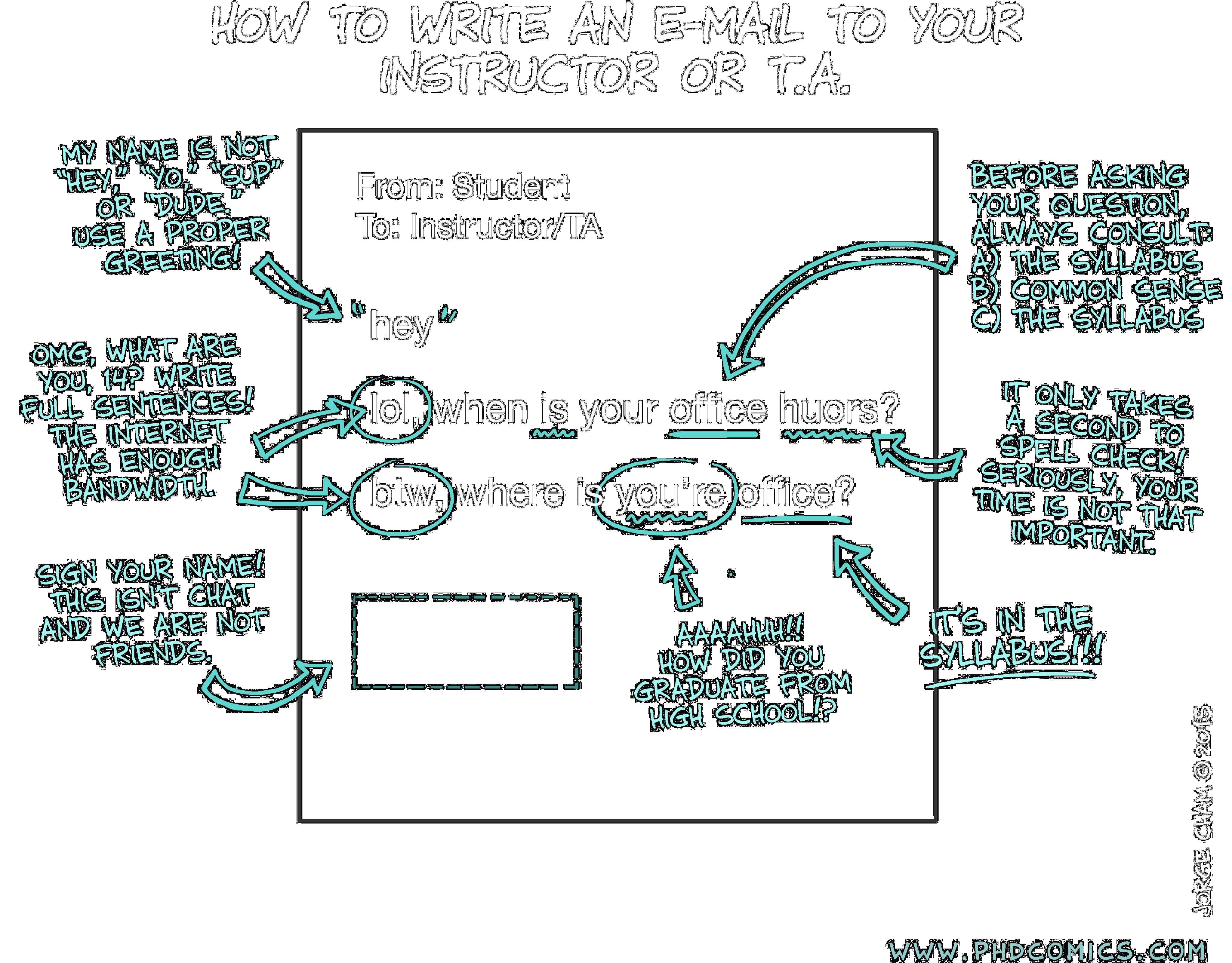
Zoom
One-on-one video conferences can be created via the class calendar in 15 minute increments. If you require more than 15 minutes, please schedule additional back-to-back sessions.
Course Policies
In a nutshell keep an open line of communication, be honest, nice, respectful to everyone, & follow the Code of Conduct.
Modifications
This syllabus outlines a plan for the term, but adjustments may become necessary as circumstances change. Therefore, I reserve the right to modify this syllabus as we progress through the course.
Health statement
WVU is committed to maintaining a safe learning environment for all students, faculty, and staff. Should campus operations change because of health concerns related to health crisis, it is possible that this course will move to a fully online delivery format. If that occurs, students will be advised of technical and/or equipment requirements, including remote proctoring software.
In a face-to-face environment, our commitment to safety requires students, staff, and instructors to observe guidelines set by the University at all times. Students who fail to comply will be dismissed from the classroom for the class period and may be referred to the Office of Student Conduct for further sanctions.
If a student becomes sick or is required to quarantine during the semester, they should notify the instructor. The student should work with the instructor to develop a plan to receive the necessary course content, activities, and assessments to complete the course learning outcomes.
Psychological and Psychiatric Services
Life at WVU can be complicated and challenging! You might feel overwhelmed, experience anxiety or depression, or struggle with relationships or family responsibilities. Psychological and Psychiatric Services provides free, confidential support for students who are struggling with mental health and emotional challenges. The office is staffed by professional counselors and psychiatrists who are attuned to the needs of all types of college and professional students. Please do not hesitate to contact them for assistance—getting help is a smart and courageous thing to do.
CARE Team
If you or anyone you know may be at-risk such as those listed here, please make a CARE referral. You may do so directly at the main WVU CARE TEAM site.
Lauren’s Promise
Foremost
I will listen and believe you if someone is threatening you!
Lauren McCluskey - a 21-year-old honors student athlete - was murdered on October 22, 2018 by a man she briefly dated on the University of Utah campus. It is imperative that this never happen again!
If you are in immediate danger, please call 911 or the Campus Police at 304-293-3136.
If you are experiencing sexual assault, domestic violence, or stalking, please report it to me and I will connect you to resources or call/text a private Title IX On-Call Line 304-906-9930.
Any form of sexual harassment or violence will not be excused or tolerated at West Virginia University. WVU has instituted procedures to respond to violations of these laws and standards, programs aimed at the prevention of such conduct, and intervention on behalf of the victims.
Academic Integrity
The integrity of the classes offered by any academic institution solidifies the foundation of its mission and cannot be sacrificed to expediency, ignorance, or blatant fraud. Therefore, I will enforce rigorous standards of academic integrity in all aspects and assignments of this course. For the detailed policy of West Virginia University regarding the definitions of acts considered to fall under academic dishonesty and possible ensuing sanctions, please see the West Virginia University Academic Catalog. Should you have any questions about possibly improper research citations or references, or any other activity that may be interpreted as an attempt at academic dishonesty, please see me before the assignment is due to discuss the matter.
Inclusivity Statement
The West Virginia University community is committed to creating and fostering a positive learning and working environment based on open communication, mutual respect, and inclusion.
If you are a person with a disability and anticipate needing any type of accommodation in order to participate in this class, please advise me and make appropriate arrangements with the Office of Accessibility Services ( 304-293-6700).
For more information on West Virginia University’s Diversity, Equity, and Inclusion initiatives, please see the Division of Diversity, Equity, and Inclusion.
Incomplete Grades
Students who want to be considered for an Incomplete must apply to their instructor prior to the end of the term. If the instructor agrees, the instructor and the student must negotiate the conditions under which the grade of I will be changed to a letter grade and sign a contract. The date to submit the incomplete work should not be set beyond the last day of class of the following semester. If the student does not complete the terms of contract, then the instructor should submit a grade of F. All incomplete contracts must be filed with the department and Dean’s Office. Students who want to be considered for an Incomplete must apply to their instructor prior to the end of the term. If the instructor agrees, the instructor and the student must negotiate the conditions under which the grade of I will be changed to a letter grade and sign a contract. The date to submit the incomplete work should not be set beyond the last day of class of the following semester. If the student does not complete the terms of contract, then the instructor should submit a grade of F. All incomplete contracts must be filed with the department and Dean’s Office. See the policy at Advising, Enrollment, & Grades.
Student Evaluation of Instruction (SEI)
Effective teaching is a primary mission of West Virginia University. Student evaluation of instruction provides the university and the instructor with feedback about your experiences in the course for review and course improvement. Your participation in the evaluation of course instruction is both strongly encouraged and highly valued. Results are strictly confidential, anonymous, and not available to the instructor until after final grades are released by Admissions and Records. Information about how you can complete this evaluation will be provided later.
University Attendance Policy
At West Virginia University, class attendance contributes significantly to academic success. Students who attend classes regularly tend to earn higher grades and have higher passing rates in courses. Excessive absences may jeopardize students’ grades or even their ability to continue in their courses. There is a strong correlation between regular class attendance and academic success.
Postings
Please follow these simple netiquette rules:
- Act as professionally in your writing as you would in a face-to-face classroom.
- Avoid typing in ALL CAPS, as it comes across as SHOUTING.
- Check that you are replying to the specific person you intend, and not the entire class.
- Disagree with ideas, but avoid comments that could be seen as personal attacks.
- Do not dominate any discussion; allow other students the chance to participate.
- If you reference someone’s post, quote only what is necessary to make your point.
- Never forward in-class communications or posts by others outside of this virtual space.
- Never give your password to another person.
- Never spam your classmates.
- Refrain from inappropriate language and derogatory or personal attacks.
Be aware of the University’s Academic Integrity and Dishonesty Policy. You can review the rules, regulations, and procedures concerning student conduct and discipline for the main campus of West Virginia University, at Student Conduct.
Response Time
I typically respond to Slack queries on the same day, while emails and discussion posts are answered within 48 hours, except during holidays. Please plan accordingly so that you do not miss deadlines! I usually return assignments within one week after the final submission date.
Technical Requirements
Students need to have access to a computer for word processing, e-mail and access to eCampus. Access to the Internet is necessary for completion of this course. Run the Browser Check. This tool will check that you are using a supported Internet browser and have a valid Java version installed. The required technical skills to participate in this course are:
- Navigate the web
- Use email with attachments
- Create and submit files in commonly used word processing program formats
- Copy and paste
- Download and install software
- Consult software tutorials and other online sources as a method of learning software features
- Use syntax when necessary
Technical Support
Technical support regarding your use of eCampus is available by contacting 304-293-4444 (telephone), 1-877-327-9260 (toll free number), itshelp@mail.wvu.edu (email), and/or Information Technology Services (website).
Ownership
Sale of Course Materials
Course materials including but not limited to lectures, class notes, quizzes, exams, handouts, and presentations provided to students for this course are protected under a Creative Commons Attribution-NonCommercial-ShareAlike 4.0 International License. Please review the sharing and editing restrictions prior to distributing or amending any material on this site. As such, the unauthorized purchase or sale of these materials may result in disciplinary sanctions under the Campus Student Code. Basically you can share what you like under the licence but don’t try to make a buck.
Lisencing Information
This work is licensed under a Creative Commons Attribution-NonCommercial-ShareAlike 4.0 International License.
…most of the time. ↩︎
